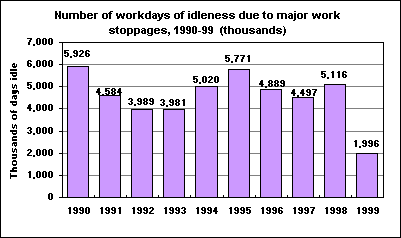An official website of the United States government
 United States Department of Labor
United States Department of Labor
In 1999, major work stoppages resulted in 2.0 million days of idleness among affected workers. This was the lowest figure ever recorded in this series, which dates back to 1947.

[Chart data—TXT]
Eighty-two percent of the year's work stoppage idleness—1.6 million days—stemmed from three disputes involving members of the United Steelworkers. A stoppage at Kaiser Aluminum and Chemical Corporation resulted in 750,000 days of idleness; one at Newport News Shipbuilding and Dry Dock Company, in 622,500 days of idleness; and the stoppage at Continental General Tire Company, in 252,000 days of idleness.
These data are a product of the BLS Office of Compensation and Working Conditions, Collective Bargaining Agreements. Learn more about work stoppages from news release USDL 00-51, "Major Work Stoppages, 1999." Major work stoppages are defined as strikes or lockouts that idle 1,000 or more workers and last at least one shift.
Bureau of Labor Statistics, U.S. Department of Labor, The Economics Daily, Days of idleness due to work stoppages at new low at https://www.bls.gov/opub/ted/2000/feb/wk5/art05.htm (visited March 04, 2026).

Recent editions of Spotlight on Statistics
